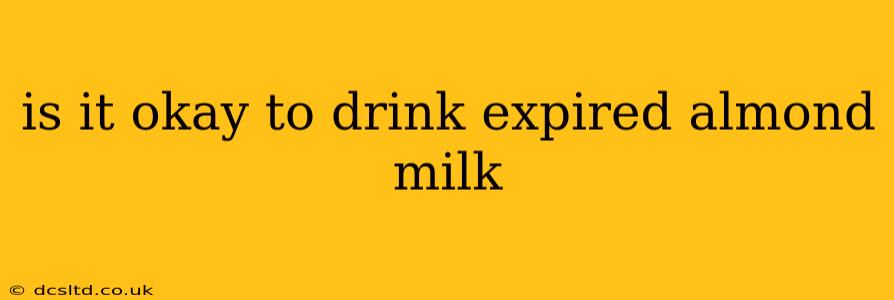Almond milk, a popular dairy-free alternative, has a relatively short shelf life once opened. But what happens after the "best by" date stamped on the carton? Is it okay to drink expired almond milk? The answer isn't a simple yes or no. Let's delve into the factors that determine the safety and palatability of almond milk after its expiration date.
How Long Does Almond Milk Last After the Expiration Date?
The shelf life of almond milk depends on several factors:
- Type of Almond Milk: Shelf-stable almond milk (UHT or ultra-high-temperature processed) typically lasts longer than refrigerated varieties. Even then, once opened, its shelf life significantly decreases.
- Storage: Proper refrigeration is crucial. Almond milk stored at room temperature will spoil much faster.
- Packaging: The type of packaging (carton, bottle) can also influence how long it remains safe to consume.
Generally, refrigerated almond milk that's past its expiration date might be safe for a few days, perhaps a week, but this is not a guarantee. The quality will likely degrade, however, leading to off-flavors and a less pleasant drinking experience. UHT almond milk, while having a longer shelf life overall, should still be used within a few days of opening.
What Happens When Almond Milk Goes Bad?
Several indicators can tell you if your almond milk has spoiled:
- Sour Smell: A sour or vinegary odor is a clear sign of spoilage. Bacteria have begun to grow, making the milk unsafe to drink.
- Off-Flavors: A rancid, bitter, or unpleasant taste indicates bacterial growth or oxidation of the fats.
- Clumpy Texture: Separation or curdling is another indicator of spoilage. The milk may appear thick or lumpy.
- Mold: Visible mold is a definitive sign that the almond milk has spoiled and should be discarded immediately.
Can You Get Sick From Drinking Expired Almond Milk?
While it's unlikely that a small amount of slightly expired almond milk will cause serious illness, it's still risky. Consuming spoiled almond milk can lead to digestive upset, such as nausea, vomiting, or diarrhea. The risk increases significantly as the milk ages past its expiration date.
How Can I Tell if My Almond Milk is Still Good?
The best approach is to use your senses: smell, taste, and sight. If anything seems off – a sour smell, a strange taste, or a change in texture – discard the milk. Don't rely solely on the expiration date.
What Should I Do With Expired Almond Milk?
Expired almond milk shouldn't be consumed. The safest course of action is to discard it. You can check with your local waste disposal guidelines for specific instructions on how to dispose of spoiled food products.
How Can I Extend the Shelf Life of Almond Milk?
- Proper Storage: Always refrigerate almond milk after opening and ensure the container is tightly sealed.
- Use it Quickly: Once opened, try to use your almond milk within a week or as quickly as possible to maximize freshness.
- Check for Spoilage: Regularly inspect the almond milk for any signs of spoilage before using it.
Ultimately, the decision of whether or not to drink expired almond milk is a personal one, but prioritizing your health and safety is paramount. Err on the side of caution and discard any milk that shows signs of spoilage. The risk of illness isn't worth the potential savings.
